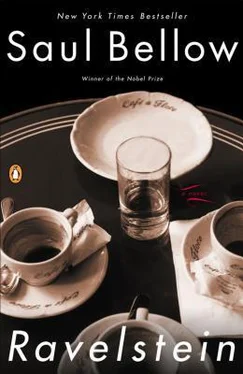I felt that I would never take this tropical paradise to my heart. Instead, as Rosamund in her lovely voice sang "Live-for-ever," I thought of Ravelstein in his grave, all his gifts, his endlessly diverting character, and his intellect entirely motionless. I don't suppose that when he directed me to write an account of his life he expected me to settle for what was characteristic-characteristic of me, is what I mean, naturally.
Rosamund and I now changed places, and I carried her through the water, the sand underfoot ridged as the surface of the sea was rippled, and inside the mouth the hard palate had its ridges too. "Shall we stop at Le Forgeron on the way home and reserve a table for tonight? It's about five minutes away on the beach."
Roxie Durkin had given us a note to M. Bйdier, who ran the joint. Rosamund had already signed us up for dinner. In the matter of restaurants you could trust the Durkins. They had seen a lot of Ravelstein in his last years. We had often dined together in Greektown or at Kurbanski's club.
The Durkins had been very thoughtful. Only one favor they had asked for in return. Durkin, a lawyer, had brought some fat volumes to Saint Martin and he had forgotten to copy out several pas sages related to a case he would soon be trying. He had asked us, as a special favor, to look them up and send them by e-mail. Rosamund had several times reminded me of these bound volumes. The landlady had a servant carry them up to our small apartment.
That evening we walked to Le Forgeron along the cooling beach. Shoes and sandals were carried by Rosamund in a reticule. We put them on before entering the gate from the ocean side. There was water trickling pleasantly into the garden-vines and shrubs, flowers. Mme. Bйdier, working in the kitchen, took no notice of us. M. Bйdier looked at Roxie's pleasant familiar note without real interest. He was a large, bald, thick-built man, organized physically with a kind of violence. His message, if it could be put in words, would have run: "I am prepared to do everything a customer [un client] may desire but I am under tremendous pressure and may blow up at any time." He was the sole waiter, and the place was filling up. There was no other helper. His wife did all the cooking. But the tourists, one was given to understand, were not their social equals.
I was aware of the influence of Ravelstein when I made such a sketch. It may as well be admitted that he often figured in daily events. This was because of the power of his personality. It was also because his life had more inner structure than mine, and I had become dependent on his power of ordering experience-it may be that he also wanted to persist. And for his part, he also needed me. Also, many people want to be rid of the dead. I, on the contrary, have a way of hanging on to them. My persistent hunch-it should be clear by now-is that they are not gone for good. Ravelstein himself would have dismissed such notions as childish. Well, perhaps they are. But I am not arguing a case, I am simply reporting. I know one loses mental respectability by acknowledging such fantasies. Even I, you see, yield to accepted opinion. But there may be simple explanations for the persistence of Ravelstein in my daily life. When he died I began to see that it had become my habit to tell him what had happened since we last met.
Nevertheless he had strange ways of turning up, and I shan't pre tend that he didn't come in obliquely from wherever it was that he continued to exist. This should not take the form of a discussion of life-after-death. I am not inclined to argue. It's only that I can't sit on information simply because it's not intellectually respectable in formation.
Now-what did M. Bйdier of the Forgeron recommend tonight? The red snapper, served cold with mayonnaise. Rosamund ordered some other fish. Neither dish was well cooked. The snapper at room temperature was clammy. The mayonnaise was like zinc ointment.
"How is it?" Rosamund asked.
"Underdone."
Tasting it, she agreed that it wasn't cooked through. It was raw at the center.
"Tell the _patron__ about it. You can speak to him in French."
"His English is better. People don't like to be trapped in dummy conversations. Why should he chat me up in French? I can take a Berlitz course, he'll think."
I could not finish the snapper. Dinner was endless.
Rosamund said, "It's an off night-they can't cook such bad food in a beautiful location like this."
You couldn't serve inedible dinners by this warm, still tropical water, with a moon to back up the setting. A restaurant ten minutes by foot from your apartment would have been a bride's dream-no shopping, peeling, cooking, serving, washing, or garbage disposal.
Toward midnight there was a lull in the air traffic. I had very soon learned how many privately owned planes came into the local airfield-a revelation of the wealth and the piloting skills of a considerable population of Americans, Mexicans, Venezuelans, Hondurans, and even Italian and French sportsmen-people who liked their reality to follow their thoughts. One thought of a place and in a matter of hours one could be in that place. In the sixteenth century, Spanish sea journeys lasted sometimes for months. Today you could play golf in Venezuela and dine the same evening in the Yucatan. Back to Pasadena in the morning, in time to catch the Orange Bowl.
When you begin to entertain such thoughts about people rich enough to buzz around and lay out their itineraries and figure gas mileage-very soon you may recognize that the air-hours fatigue you will feel is _your__ fatigue.
The fact was that Bйdier of the Forgeron had infected me.
When I complained of tiredness and low energy, Rosamund told me that it was the accumulation of fatigue aggravated by worry and grief. She, too, was still grieving for poor Ravelstein, destroyed by his reckless sex habits. Rosamund did not dismiss your com plaints-she gave them her full attention without irritability. She said that holidays often began with such burdensome and heavy feelings. She stroked my face affectionately and told me I must catch up on my sleep.
I did just that but felt no better. The toxin carried by the fish was heat resistant, I was to learn, and more boiling or baking could not neutralize it. As it was explained to me later in Boston, the cigua toxin was quickly excreted by the body but not before it had radically damaged the nervous system. Very much like Ravelstein's Guillain-Barrй syndrome. Among the first symptoms is a sudden distaste for food. I even disliked the look of it. I came to loathe all food odors. For dinner I could eat only cornflakes with a bit of milk. I kept telling Rosamund that this was all to the good. I was losing unwanted weight. Like everyone in the U. S., I said, I was grossly overfed.
The French family in the apartment below had come from Rouen to be easy and hang loose, unbuckled in the tropics. They swam in the smooth sea; so did Rosamund and I. We dried ourselves on the beach, chatting pleasantly. But the odors rising from their kitchen were becoming unbearable. I said to Rosamund, "What kind of shit are they cooking?"
"Is it as bad as that?" said Rosamund.
Then I lectured her on the decline of French cooking. "You used to be able to get good food in any _bistrot__. Maybe tourism has brought down the standards. Or isn't it possible that the disappearance of the peasantry is ruining French cookery?"
"One of the pleasures of living with you, Chick, is that you have so many thoughts on every subject. But you seem to have lost your appetite entirely. I have one theory myself: you've been so strained-overstrained, wrung out-that this peaceful place is too peaceful for you. You're just wound up too tight." She was evidently worried by the force and violence of my reactions.
"I have to get away from this awful food stink."
Читать дальше












